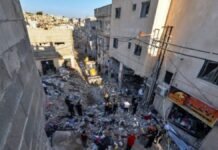
Key Points
- Parle-G Biscuit Sells for ₹2,300–2,400: Once a ₹5 staple in India, a single packet now costs over 24 euros in Gaza due to extreme scarcity.
- Man-Made Famine: Israel’s blockade and military actions have created severe food shortages, pushing everyday items onto the black market at astronomical prices.
- Viral Symbol: A Gaza father’s viral post about buying Parle-G for his daughter highlights the desperation and emotional toll of the crisis.
- Aid Exploitation and Black Market: Humanitarian aid often fails to reach ordinary Gazans, fueling profiteering and price gouging.
- Wider Impact: Prices for essentials like sugar, onions, and flour have also skyrocketed, with famine and malnutrition now widespread.
Gaza: In India, Parle-G biscuits are a morning staple affordable, nostalgic, and found in every corner shop. But in war-torn Gaza, this humble treat has become a rare luxury, selling for an astonishing ₹2,300–2,400 per packet, nearly 500 times its price in India.
Viral Story Highlights Gaza’s Desperation
The crisis came into global focus after a Gaza father, Mohammed Jawad, shared a viral post showing his daughter Rafif clutching a Parle-G packet. He revealed he paid over 24 euros (about ₹2,342) for the biscuits, a price leap from the usual ₹5 in India or ₹100 in international markets. “Even though the price jumped from €1.5 to over €24, I just couldn’t deny Rafif her favorite treat,” he wrote, capturing both the hardship and resilience of families in Gaza.
Manufactured Famine: How Blockade and War Created a Black Market
Since the escalation of the Israel-Hamas conflict in October 2023, Gaza has faced a near-total blockade. Israel’s military campaign and closure of border crossings have led to acute shortages of food and essentials. Humanitarian aid, when allowed, is insufficient and often fails to reach the majority of civilians. This scarcity has turned basic goods into black market commodities, with profiteers selling donated aid at exorbitant prices.
Dr. Khaled Alshawwa, a surgeon in Gaza City, explained, “These goods usually enter Gaza as humanitarian aid, free of charge. But only a minority receives them. Scarcity turns them into high-priced black market goods.” He himself paid around ₹240 for a Parle-G packet, but in some areas, prices soar above ₹2,000, depending on the seller and location.
Soaring Prices for All Essentials
Parle-G is not the only item affected. The price of 1 kg of sugar has reached ₹4,914, onions ₹4,423, and flour up to $500 per bag in some areas. Most people now survive on a single meal a day, and malnutrition, especially among children and pregnant women, is surging.
Aid Distribution: Chaos, Exploitation, and Unmet Needs
Aid distribution in Gaza has become chaotic and dangerous. International organizations have warned that the limited aid allowed in is “a drop in the ocean” compared to the need. Reports of looting, black market profiteering, and accusations that Hamas and other groups are intercepting aid for resale have further complicated the crisis.
Global Reaction and Symbolism
The viral story of Rafif and her Parle-G biscuits has resonated worldwide, especially in India, where the snack is a symbol of simplicity and comfort. Social media users have called for more aid and direct support, while others have expressed outrage at the profiteering and exploitation of humanitarian supplies.






















































